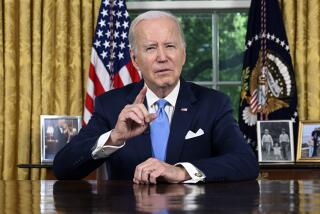Boren Hails Shift on Energy Tax : Budget: Democratic critic says Clinton’s willingness to scale back levy improves chances of passing deficit-reduction package by “100%.” Some differences remain.
- Share via
WASHINGTON — In a sharp turnaround that may ensure Senate passage of President Clinton’s $496-billion deficit-reduction package, Sen. David L. Boren (D-Okla.) said Sunday that he is “feeling very, very good” about Clinton’s decision to scale back a proposed energy tax.
Clinton’s willingness to compromise has improved the chances of passage by “100%,” he said.
While differences still must be negotiated, “I think we’ve come a long way,” said Boren, who has led a small but crucial group of Democrats in opposing Clinton’s plan. “I think there’s a lot of room for agreement,” he said during an appearance on CBS-TV’s “Face the Nation.”
Administration officials reacted heartily.
“I’m very encouraged by Sen. Boren’s comments,” said Leon E. Panetta, director of the Office of Management and Budget.
Paul Begala, a top White House political adviser, was even more optimistic, saying: “We’ve been talking with Sen. Boren, and it looks to me like this package is a go.”
The controversial tax, which would be based on the energy content of different fuels as measured in British thermal units, was expected to raise $72 billion over five years. It is opposed by oil-state lawmakers, who fear that it will hurt the energy industry and cause widespread job loss.
Panetta, also speaking on “Face the Nation,” emphasized that the President still insists that the final deficit-reduction package contain “some kind of broad-based energy tax.”
“The key here is that, whatever you scale it back with, you’ve got to make up the difference some way so that we don’t lose the $500 billion in deficit-reduction,” Panetta said.
The deficit-reduction package was approved by the House last Thursday night, 219 to 213, but it faces an uncertain future in the Senate Finance Committee, which has 11 Democrats and nine Republicans, including Boren and Sen. John B. Breaux (D-La.), another opponent of the BTU tax.
Breaux said on CNN’s “Newsmaker Saturday” that he had told Clinton that the tax proposal would not get his vote without “some major and dramatic changes,” such as a gasoline tax as a substitute.
“I think the President will accept and will ultimately support modifications to the BTU tax,” Breaux predicted.
The Times reported on Saturday that Clinton is prepared to abandon most elements of the BTU tax and accept instead as much as an 8-cent-per-gallon gasoline tax increase as the price of winning Senate approval of his economic package.
While Administration officials denied that Clinton may agree to deep cuts in his BTU tax proposal, his decision was confirmed publicly on Sunday by Boren and Sen. Daniel Patrick Moynihan (D-N.Y.), chairman of the Senate Finance Committee.
In an interview with the New York Times, Moynihan said his panel and the White House may end up exempting entire industries from the BTU tax while offsetting revenue losses with additional spending cuts, possibly in Medicare.
Boren said he wants to make sure that any BTU tax is not pegged to the cost of living, which he claimed could make the levy inflationary and “a cash cow for new spending.”
Asked if he would be satisfied if the BTU tax were reduced by $20 billion, Boren noted that the tax as proposed includes the rough equivalent of an 8-cent gasoline tax increase, or about $40 billion.
“Now I’m not suggesting that we should just use that portion of the gasoline tax. . . . You might want to consider some excise taxes on electricity or some kind of a carbon tax proposal or something else,” Boren said.
Still another point of contention between Boren and the President is whether to make the tax retroactive to Jan. 1, as Clinton has proposed.
Panetta signaled the Administration’s willingness to negotiate on that point as well.
“I think that’s something to look at as part of this overall package,” he said. “I think we have a very good chance of getting this package done.”
Boren, who is also pushing for still deeper spending cuts in federal spending, quoted the President as having told him during a Friday telephone conversation: “We are ready to change our plan so that we have more spending cuts and less tax increases on balance in this plan.”
Boren commented: “Now, that’s really moving in the right direction. That was even more important to me, perhaps, than the BTU tax.”
Interviewed Sunday on ABC-TV’s “This Week With David Brinkley,” Senate Minority Leader Bob Dole (R-Kan.) said that if the Administration were to eliminate “much of the new spending” in its economic package, it “might attract some Republicans.” So far, Republicans have been virtually unanimous in opposing the plan.
More to Read
Get the L.A. Times Politics newsletter
Deeply reported insights into legislation, politics and policy from Sacramento, Washington and beyond. In your inbox twice per week.
You may occasionally receive promotional content from the Los Angeles Times.










